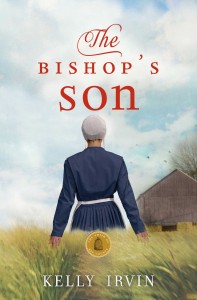 Today’s post is by Kelly Irvin, a graduate of the University of Kansas School of Journalism. She has worked as a professional writer for thirty years. Her latest works are novels set in an Amish community. The Beekeeper’s Son received a starred review from Publisher’s Weekly. She has also written two inspirational suspense novels.
Today’s post is by Kelly Irvin, a graduate of the University of Kansas School of Journalism. She has worked as a professional writer for thirty years. Her latest works are novels set in an Amish community. The Beekeeper’s Son received a starred review from Publisher’s Weekly. She has also written two inspirational suspense novels.
A trip to South Texas
When people think about the Amish, they usually draw on images they’ve seen in the media of pristine white houses with big barns and beautiful flower gardens amid green, lush fields. It’s an idyllic existence if photos are really worth a thousand words. That’s why I was so shocked and surprised when I decided to visit Bee County, Texas, the home of Texas’ only Amish District, and found something completely the opposite.
I planned to write a series based on this tiny community so it seemed firsthand research was in order. Bee County is about a two-hour drive south of San Antonio, where I live. The Amish community isn’t easy to find unless you know what you’re looking for. You pass a sign that says fresh eggs for sale, an old, rural cemetery, and turn onto Tynan Road at a sign that announces honey for sale. You know you’ve arrived when you see the Combination Store on the right with a broken down, old buggy in front and a junkyard of old buggy parts adjacent to the faded, rusty building.
 All the buildings in this community of about 12 families have a similar appearance. I pulled in, turned off the ignition, and sat there contemplating. Was there a statement being made in the lack of fresh paint? Was it poverty? It certainly couldn’t be laziness, given the Amish’s propensity for hard work. I spent some time in the store that day and chatted with the owner, Mr. Borntrager Senior, about the noisy cicadas and the olive trees I’d read they were trying to grow. I bought some honey and a book about caring for beehives. Mr. Borntrager Junior told me they had 300 apiaries on the adjoining properties. That’s a lot of honey and a lot of work. They grow vegetables and sell them to the state’s largest grocery chain. They also make leather goods and train horses. Mr. Borntrager Senior builds custom made buggies and likes to bird watch.
All the buildings in this community of about 12 families have a similar appearance. I pulled in, turned off the ignition, and sat there contemplating. Was there a statement being made in the lack of fresh paint? Was it poverty? It certainly couldn’t be laziness, given the Amish’s propensity for hard work. I spent some time in the store that day and chatted with the owner, Mr. Borntrager Senior, about the noisy cicadas and the olive trees I’d read they were trying to grow. I bought some honey and a book about caring for beehives. Mr. Borntrager Junior told me they had 300 apiaries on the adjoining properties. That’s a lot of honey and a lot of work. They grow vegetables and sell them to the state’s largest grocery chain. They also make leather goods and train horses. Mr. Borntrager Senior builds custom made buggies and likes to bird watch.
What they don’t do is worry too much about outward trappings. They don’t have much in the way of material goods, but they feed their families and put clothes on their backs. I’ve driven through the scattering of buildings on various occasions and seen the women hard at work hand picking the vegetables in the gardens. I visited their annual fund-raising auction in November and talked with some of the neighbors who were a first name basis with the Borntrager clan. They had only good things to say about these quiet, unassuming families.
I’ve spent the last three years learning about these Amish folks and writing three novels using their little community as a springboard. The books are surely fiction and in no way reflect the true inner workings of this tight knit group of mostly related families. What I’ve learned is that we too often get caught up in the world’s definition of beauty. South Texas is a drought-stricken barren place where farming is even harder than it is up north, where it’s by no means a piece of cake. The Amish of Bee County have taken a rough patch of Texas land and made it their own.
I don’t know for certain, but my writer’s imagination suggests there are times when choosing to stay or go is an enormous challenge. In the second book in the series, The Bishop’s Son, my hero and heroine struggle with that question. Not because they want an easier life, but because they want to worship in a different way. In order to do that, they have to leave their families and friends for good. Never talk to them again. From our non-Amish perspective, leaving behind all that hard work might sound good, but for my characters the struggle is heartbreaking. In the end, they have to decide between faith and family. I’ve learned not to judge a book by its cover. The families of Bee County would be hard to leave behind for any reason.
JIM: Here’s a bit more on The Bishop’s Son.
Leila Lantz is in danger of losing her heart to a Plain man until she discovers he’s not so Plain after all.
Leila has been drawn to Jesse Glick, the bishop’s son, since the first day she met him at his father’s store, and she knows he feels the same way about her. But she can’t understand why he seems to make overtures one day, then withdraw the next.
Jesse has a secret. He has been attending an Englisch church youth group, and he’s starting to believe he’s being called to be a minister, something Amish men cannot be unless they draw the lot. He’s considering leaving his Amish community to follow his calling. The only reason he has stayed is Leila. Will, Jesse’s cousin, has his own feelings for Leila, but he has stood back in deference to his cousin for many months. Until he can’t stand the thought of Leila being hurt.
Leila can choose Will and know that she will never have to leave her home or family. Or she can choose Jesse and the love her heart desires, knowing she’ll have to say goodbye to her entire community. The day comes when Jesse, Will, and Leila all have to make their choices, choices that will deeply affect their small, close-knit community of Plain families.
If you have a moment, leave Kelly a comment.

Let me just say as a read that does not care for Amish fiction, for and author to create an Amish story that remains one of my all time favorite stories, says a lot about the author. I can’t begin to tell you how much I LOVED The Beekeeper’s Son. Well, perhaps I can, http://kymmcnabney.blogspot.com/2015/02/amish-really-who-would-have-ever-guessed.html. I currently have The Bishop’s Son, and can’t wait to get started, and that is only because I love Kelly Irvin’s writing and storytelling so much.
I’m so glad you liked The Beekeeper’s Son, Kim! Thank you for writing about it. I hope you like The Bishop’s Son just as much!
It’s been quite a while since I visited Amish country in Pennsylvania, and Kelly, your blog makes me want to return to that lovely part of the country where the people, the food, the produce, the crafts drew me to visit many times over many years. Your novels sound so interesting. Jim, thanks for hosting Kelly today.
I visited the Amish in Jamesport, Missouri, and it was fascinating. I hope you get to make a trip to your favorite Amish community soon!
Having lived near the Amish most of my life, I’m not surprised to learn of a colony in Texas. The need for land for their children (as well as it’s ever-increasing cost) have sent them to many other states far from their original U.S. roots. Those not familiar with their ways often tend to romanticize their lifestyle. It’s often a hard life, which may explain why they developed the system called Rumspringa. It’s a period when adolescents are released from the church and its rules to experience life, even ‘English’ life, before being baptized and taking on adult responsibilities. Given this taste of modern life, many do opt to leave the society–another hard choice, since they are then shunned by family and friends.
Kelly, this is fascinating. I had no idea there was an Amish community in Texas. (I’m a former Texan myself, so I should have known.) I imagine the Amish to be an honorable bunch, choosing to live in a preindustrial society. I don’t know why they do it, or how they manage, but I can’t help admiring them for it. Clearly “progress” has its hazards.
Literature reflects life, for sure. Ms. Irvin had to do a lot of research to bring such a tale to life.
The refugees from Syria and other war-torn areas must have similar decisions to make. At least the Amish are peaceful in their rejection of people who don’t share their faith.
In the past ten years Amish families have moved into the area of Upstate New York where we make our home during the summer. They are the stereotypic Amish you described with their neat, white houses and barns and their buggies and horses. One family recently opened a farm stand where I have purchased some of the most beautiful vegetables around here, big, clean, lovely. They are friendly, hard-working neighbors, like the people in Bee County. I’m wondering how your Amish have reacted to your creating a fictional story about their lives?
I doubt they are even aware of it, Lesley. They live their lives and are pleasant to those who come into the store or interact with them when they sell their produce or come to the auction, but they don’t go out of their way to seek contact. I can’t imagine them reading my books!